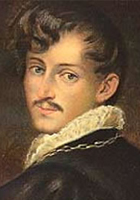Joseph Freiherr von Eichendorff
Joseph Freiherr von Eichendorff Poems
Es war, als hätt' der Himmel
Die Erde still geküsst
Dass sie im Blütenschimmer
...
What a deep and nice silence
How alone I'm in this world
The woods ease their violence
...
When God's favour for someone
To far lands gives him His run
Willing to show his miracles' lots
...
Like blue breeze is mildly flowing
Springtime, springtime carrying in
Woodsbound a horn sound's blowing
...
In a cool meadow hollow
Where a mill wheel slowly spins
My girl-friend made me sorrow
...
Joseph Freiherr von Eichendorff Biography
Joseph Karl Benedikt Freiherr von Eichendorff (March 10, 1788 – November 26, 1857) was a German poet and novelist of the later German romantic school. Eichendorff's guiding poetic theme was that Man should find happiness in full absorption of the beauties and changing moods of Nature. He also wrote a history of German literature that was posthumously published. Eichendorff's poetry has been set by many composers, including Schumann, Mendelssohn, Brahms, Hugo Wolf, Richard Strauss, Friedrich Nietzsche, Hans Pfitzner, and Alexander Zemlinsky. Eichendorff's best known work, Aus dem Leben eines Taugenichts (English: Of the Life of a Good-For-Nothing) is typical romantic novella, whose main themes are voyage and love. The protagonist leaves his father's mill and becomes a gardener at a Viennese castle where he falls in love with the daughter of the duke. Because she is unattainable he travels to Italy but then returns and learns that she had been adopted by the duke, so nothing stands in the way of a marriage between them.)
The Best Poem Of Joseph Freiherr von Eichendorff
Night Of The Moon
It was as though the sky
had silently kissed the earth,
so that it now had to dream of sky
in shimmers of flowers.
The air went through the fields,
the corn-ears leaned heavy down
the woods swished softly—
so clear with stars was the night
And my soul stretched
its wings out wide,
flew through the silent lands
as though it were flying home.

Und meine seele spannte weit ihre Flügel aus; flog durch die stillen Lande, als flöge sie nach Haus... Joseph Freiherr von Eichendorff